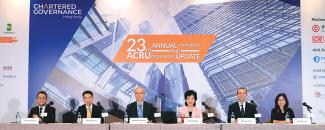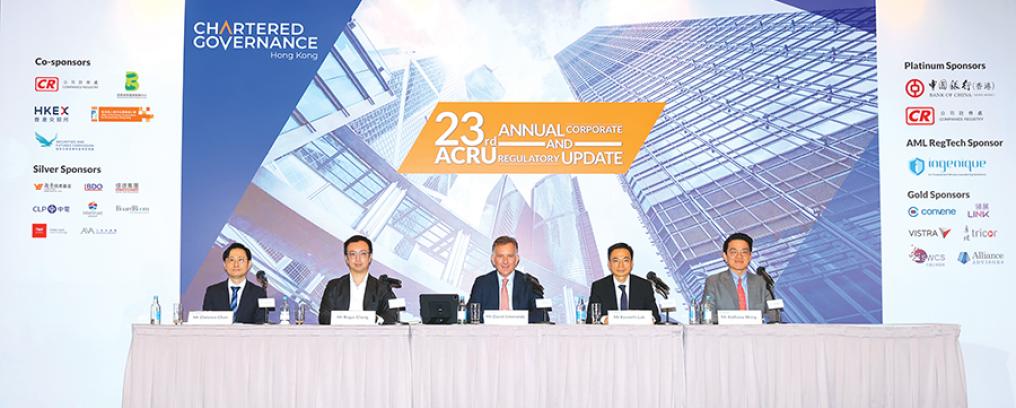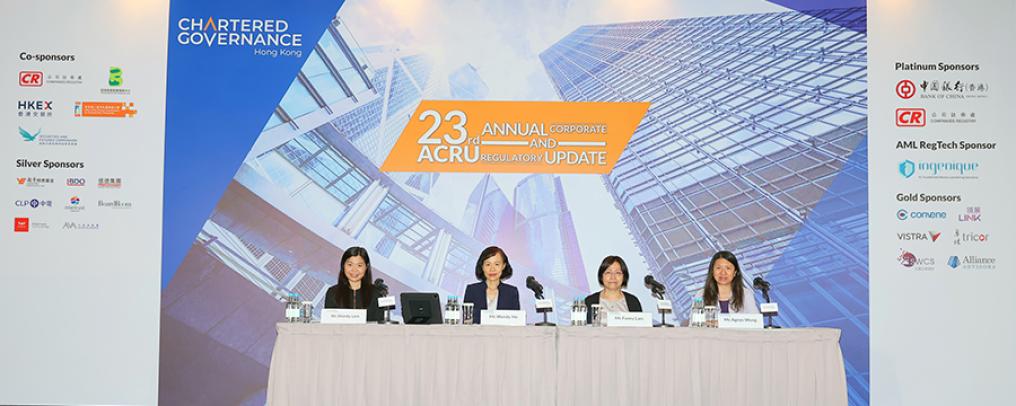
The critical role of internal controls – ACRU 2022 review: part one
This first part of CGj’s review of the Institute’s 23rd Annual Corporate and Regulatory Update (ACRU), held on 9 June 2022, highlights key takeaways from the first session, featuring speakers from Hong Kong Exchanges and Clearing Ltd (HKEX).
In the 12 months since the Institute’s previous ACRU, listed company enforcement activity has continued to rise in Hong Kong. Last year’s ACRU came shortly after HKEX entered a ‘new chapter’ in its enforcement work. With the benefit of recently enhanced disciplinary powers and sanctions, HKEX has continued to strengthen its enforcement of the Listing Rules and to focus on individuals responsible for compliance breaches.
The impact of this on its enforcement caseload has been visible in the last financial year, said Jon Witts, Head of Enforcement, Listing Division, HKEX. Speaking in first session of the day, chaired by Edith Shih FCG(CS, CGP) HKFCG(CS, CGP)(PE), Institute Past President and International Past President, he reported that HKEX has published sanctions in over 30 cases, involving sanctions against over 160 individuals.
In this context, he focused his ACRU presentation on the critical importance of listed companies establishing and maintaining effective internal control frameworks. He pointed out that, in the majority of cases handled by HKEX in its enforcement work, breaches of the Listing Rules by the company could have been avoided if directors had properly discharged their responsibilities in respect of regulatory compliance and internal controls.
He then outlined three crucial components of effective internal controls frameworks.
Recommendations on internal controls
1. Setting up a framework
Setting up an internal controls framework is not simply a matter of having the right policies in place. Mr Witts emphasised that having impressive-sounding policies is worthless if you don’t have the necessary procedures and processes to back them up. ‘Policies are important high-level statements, but writing policies for a control framework will not get you to where you need to be. You need to have the procedures in place to make sure that the policies are brought into effect. You also need to have checks and balances across the organisation to make sure that people are given the right authority and can use the framework in the right way,’ he said.
He added that HKEX investigations will not only consider potential compliance failures, but also whether directors failed to discharge their duties in respect of establishing and maintaining effective internal controls. If so, disciplinary action may follow even if no breach or misconduct is found to have occurred at the company level.
A key part of an effective internal control framework is internal audit. Mr Witts warned that companies without a strong internal audit mechanism are at risk of getting into serious trouble. Moreover, the internal audit function needs to be adequately resourced. By way of example, he cited a recent enforcement case (Beijing Media Corporation Ltd – sanctioned in February this year), in which the company had an internal audit department but it only comprised one person. ‘They didn’t have the resources and, unsurprisingly, failed to pick up on a whole range of control deficiencies which contributed to their problems. Directors need to make sure that there are proper resources in place,’ he said.
2. Reviewing effectiveness
Just as important as establishing a framework is reviewing it for ongoing effectiveness. Mr Witts emphasised that, once again, this review needs to look deeper than the policy level. ‘The internal controls need to be tested to check that the processes are actually working,’ he said.
He recommended that ACRU participants read the latest HKEX Enforcement Bulletin which gives practical advice on internal controls. In particular, the Bulletin cites the recently updated Assistance Options to New Applicants and Sponsors in connection with Internal Controls over Financial Reporting (AATB 1), published by The Hong Kong Institute of Certified Public Accountants (HKICPA). Appendix 3 of AATB 1 contains a six-page list of bullet points itemising the sorts of things that companies should be thinking about when reviewing their internal controls – a good reminder, Mr Witts said, of the scale of the work that needs to be done.
3. Training
A third essential component of an effective framework is the training needed to ensure that everyone – directors, managers and staff – knows how to use it. Mr Witts pointed out that this is particularly important for managers working for subsidiaries outside Hong Kong who may be less familiar with the Hong Kong regulations. Directors should make sure that appropriate training and information is available to everyone in the group.
ESG and climate change
ESG and climate change issues continue to climb the regulatory agenda. Kelly Lee, Vice-President, Policy and Secretariat Services, Listing Division, HKEX, gave ACRU participants a preview of upcoming HKEX initiatives in this space. Her core message was that HKEX will continue to upgrade the ESG and climate change disclosure requirements for listed companies in Hong Kong to align them with international standards.
International standards are increasingly coalescing around the requirements of the Task Force on Climate-related Financial Disclosures (TCFD) and the International Sustainability Standards Board (ISSB). HKEX has already incorporated key elements of the TCFD recommendations into Hong Kong’s ESG framework. For example, since July 2020 listed companies have had to report on the board’s governance of ESG matters and their handling of climate change issues.
To further promote more transparent and comparable climate disclosure amongst listed companies, Ms Lee confirmed that HKEX will focus future upgrades of Hong Kong’s regime on closing the gaps with the TCFD and particularly the ISSB emerging standards – which are still under consultation and are expected to be published by the end of the year.
‘We need to keep up our existing framework to reflect international developments. This year we will again conduct a review of our ESG framework and focus on how we can further enhance climate disclosures from our issuers. The focus areas will be on meaningful and decision-useful climate information that is consistent with international standards, taking into account the market readiness and capabilities of our companies,’ she said.
Listed issuers can expect tougher disclosure requirements relating to their use of scenario analysis for climate change risk management. They can also expect broader scope green house gas (GHG) emission reporting and more specific metrics in relation to climate-related risks.
Ms Lee urged the company secretaries and governance professionals in the ACRU audience to update their board of directors on this. ‘Directors need to get to know the ISSB standards and the TCFD recommendations, and to identify any gaps with internal policies and practices. They then need to consider whether they need any system enhancements in preparation for the enhanced climate disclosures going forward,’ she said.
Directors’ duties
HKEX has from time to time observed a number of corporate transactions where directors might have failed to apply proper due diligence to protect the interests of the company and its shareholders. In his ACRU presentation, Max Cheng, Vice-President, Listed Issuer Regulation, Listing Division, HKEX, emphasised that HKEX expects to see directors use independent judgement when assessing whether the terms of such transactions are fair and reasonable. In particular, they should not take a checklist approach to this.
HKEX has observed cases where listed companies have agreed to pay high prices for acquisitions outside their principal businesses. He reminded directors of their duty to critically assess the value of potential acquisitions. Even where an independent professional valuation has been given, directors are expected to exercise their own judgement and not to overly rely on one source of information. They should at least be assessing the assumptions of the valuation and reviewing the business operations of the target.
Moreover, where the vendor provides warranties or guarantees, directors should consider whether the vendors are in a position to fulfil these obligations. Where a target is a newly established business that lacks a track record, directors should be particularly cautious about relying on any profit guarantees given.
‘In some cases the vendor provided guarantees, but there was very limited recourse for the issuer to safeguard against a failure of these contractual obligations. In the end, the issuers faced material impairments on the assets shortly after acquisition, resulting in a dissipation of shareholders’ assets,’ Mr Cheng said.
HKEX has also observed a number of cases where listed companies lent money or made advance payments that lacked apparent commercial merits. Mr Cheng reminded ACRU participants of the need for directors to fulfil their duties in overseeing lending transactions and ensuring that all the necessary disclosures are made.
Financial reporting
The accuracy and timeliness of financial disclosures by listed companies has been the subject of increased scrutiny during the Covid-19 pandemic, and two HKEX speakers updated ACRU participants on this area. William Wong, Head of Accounting Affairs, Listing Division, HKEX, highlighted the findings and recommendations of HKEX’s latest review of companies’ annual report financial disclosures for the 2020 financial year-end. While HKEX is generally satisfied with issuers’ compliance with the required and recommended disclosures, Mr Wong focused his presentation on several key areas where they can continue to improve.
Patrick Yu, Senior Vice-President, Listed Issuer Regulation, Listing Division, HKEX, addressed the impacts of the Covid-19 pandemic on the ability of listed companies to meet the publication deadline for their audited financial results. The ‘fifth wave’ of the pandemic (January to May 2022) coincided with the peak season for financial reporting in Hong Kong. Nevertheless, Mr Yu confirmed that close to 90% of companies with a December year-end were able to comply fully with the Listing Rule requirement to publish audited financial results by the end of March.
Lockdowns in Hong Kong and the Mainland hampered the audit and financial report preparation work, but, since 2020, both HKEX and the Securities and Futures Commission (SFC) have permitted listed companies to continue trading if they publish their preliminary results (results without the auditors’ agreement) and make a subsequent announcement regarding the auditors’ agreement. About 200 companies so far have enjoyed this timing relief.
‘This figure is a lot higher than last year because of the fifth wave of the pandemic,’ Mr Yu said. He added that the timing relief does not give listed companies an automatic extension, but is designed to give relief on a case-by-case basis. He therefore urged any companies with a March year-end that foresee difficulties in publishing their financial results on time to get in touch with HKEX.
In addition to the timing of annual reports, Mr Yu also addressed the level of compliance with the disclosure requirements. He highlighted, in particular, the level of compliance with the new requirement under the revised Corporate Governance Code, effective 1 January 2022, relating to listed companies proposing to re-elect independent non-executive directors (INEDs) who have served the board for more than nine years. Such companies are required to disclose in their AGM circulars:
- why the long-serving INED is still considered independent, and
- where all the INEDs have served more than nine years on the board, the length of tenure of each INED on a named basis.
While compliance with the first requirement was around 95%, a little under half the listed companies failed to comply with the second requirement. Mr Yu speculated that they may have assumed that disclosure was only necessary for INEDs up for re-election. He emphasised that, where all the INEDs have served more than nine years, the requirement applies to all of them, regardless of whether they are up for election or not.
Under the comply-or-explain regime in operation for Hong Kong’s Code, companies who omitted to disclose this information will be expected to explain why not in their CG Report. He added that similar requirements apply to the nomination of INEDs who will be holding their seventh (or more) listed company directorship.
The Institute’s 23rd Annual Corporate and Regulatory Update was held on 9 June 2022. More information is available on the HKEX website: www.hkex.com.


